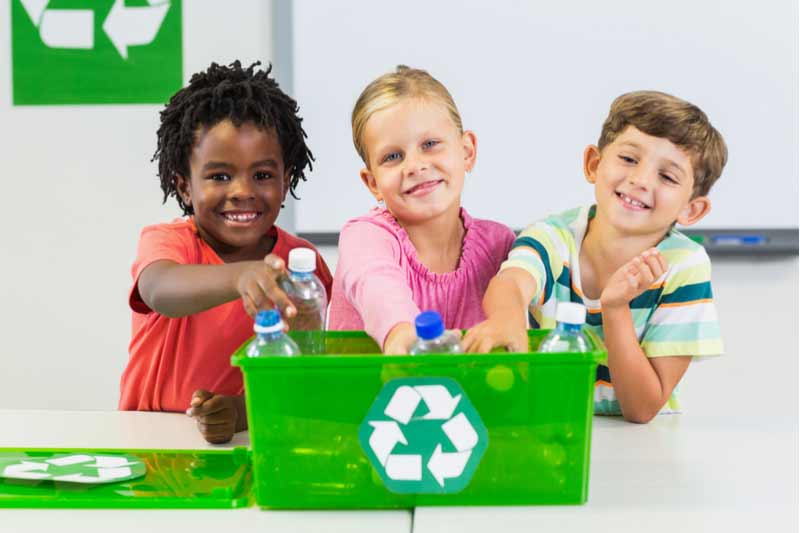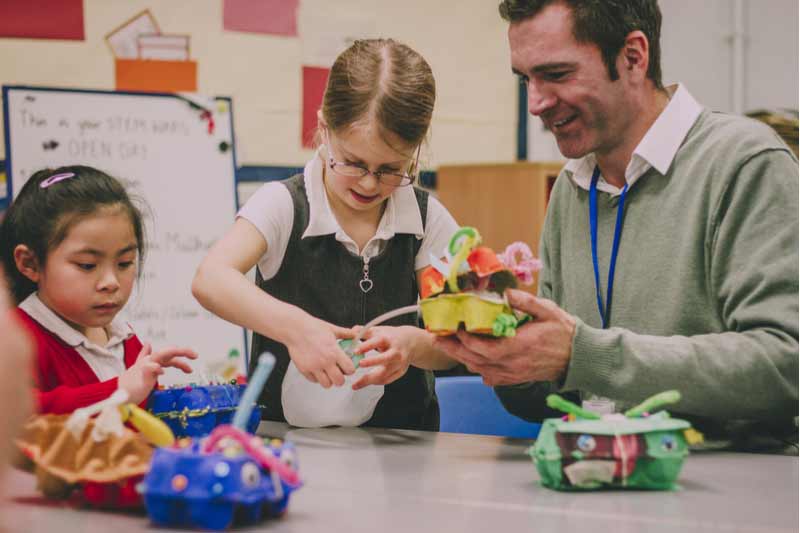How to encourage children to recycle in schools
There is no age limit when it comes to starting to recycle and make a difference to our planet. So, it makes perfect sense to encourage children to be environmentally aware and demonstrate how their future really is in their hands.
Starting recycling at an early age can instil good habits which will last a lifetime and even inspire families at home to be greener. Schools have a fantastic opportunity to transform children into green superheroes to help save
the planet for future generations.
The challenge is twofold. Firstly, schools can equip pupils with the knowledge to become greener themselves but there’s also the opportunity to bring children on board in helping schools become greener too – helping to demonstrate
the benefits of recycling in action. As much as 80% of school waste is estimated to be recyclable so acting will make a real difference to a school’s sustainability agenda.

If your school is looking for ideas on how to encourage pupils to recycle and promote a sustainable, environmentally friendly future, here are phs Wastekit’s tips:
- Make recycling easy and fun
- Put recycling in their hands
- Explore the real impact of waste
- Create a school eco committee
- Get creative
- Reduce single-use plastic
- Make it real
- Create a school compost
- Lesson planning
- Pre-loved stalls
- Transform cardboard waste into cash
Make recycling easy and fun
To make recycling easy, it needs to be accessible, so you’ll need recycling bins in key locations such as classrooms, dining areas, corridors and playgrounds. Colour code and clearly label each bin so pupils know what belongs in
each; include pictures which will help easily identify the bins. Recycling should be part of everyday life so don’t necessarily reward every item that’s put in the recycling bin. Instead, consider simple and fun actions like
high-fives or a bell which can be rung by pupils who recycle.
Put recycling in their hands
Demonstrate how easy it is to recycle by asking pupils to do it themselves. When there’s rubbish to be thrown away whether in the classroom or after eating, talk about where it should go and empower them to dispose of it themselves.
When it’s tidy up time, gather the rubbish and collectively look at what could be reused or repurposed and what can be recycled. This is also a good opportunity to identify where less waste could be produced and asking children
what they could do next time – for instance, using scrap paper, using both sides of a sheet of paper or even cutting up paper to share with a classmate if they only need a small piece. Once they’re informed, recycling will
become part and parcel of everyday school life.
Explore the real impact of waste
Reinforce recycling lessons by getting out in the great outdoors to explore nature. Here you can help pupils see what impact waste can have whether it’s rubbish strewn in hedgerows or plastic washing up on the beach. Host a litter
pick so pupils can take pride in their natural surroundings. You could even set a challenge for pupils to do something green at home during the holidays. Some landfill and recycling sites offer school visits so you could take
pupils on a trip to see what happens to their waste – and just how much we are all producing.

Create a school eco committee
Ask each class to nominate one or two pupils to form an eco-committee, tasked with coming up with ideas on how the school can be greener. But make sure this doesn’t put off others from being involved by hosting class debates and
brainstorms so everyone can contribute and alternate committee members regularly.
Get creative
Keep a box set aside for recycling which can be repurposed. For instance, lids that can be used for artwork, bottles that can be transformed into lanterns and jars that can be used to store pens or treasures. You could even ask
children to bring in artwork made from recycled materials from home for show and tell. Odd socks make fantastic puppets, shoe boxes can become houses for toys and cereal boxes can be made into dioramas.
Reduce single-use plastic
Create a pledge to reduce single-use plastics across the school whether it’s by switching to reusable cups in the staffroom and canteen or requesting children bring re-fillable drinks bottles instead of disposable bottles. Consider
a waste-free lunch fortnight with a ban on the likes of plastic sandwich bags and yogurt pots to help explore alternatives such as reusable snack boxes.
Make it real
Help children visualise how much waste is thrown away – and what could be done about it. For instance, recycling one plastic bottle could light a room for a school day, half a recycled banana peel could generate enough electricity
to charge a smartphone while 35 recycled teabags would power a TV for an hour. Set a task for children to design posters to display in school, at home and within the community inspiring others to recycle more.
Create a school compost
Setting up a compost at school is a fun, hands-on activity for pupils as well as reducing the school’s organic waste. This can be used on the school grounds or even to create a community vegetable plot.
.jpg)
Lesson planning
While specific lesson plans are ideal for educating pupils on the environment, incorporate sustainability into other topics too. Writing poems, stories and essays on recycling and saving the planet is great for English lessons
while tracking school recycling rates is a good maths challenge. For art, pupils can design the labels for your recycling bins or create posters – as well as using recycled products for craft projects.
Pre-loved stalls
Make it easy for pupils and parents to swap or share pre-loved items such as school uniform or books. You can either set up a permanent station in school, host a termly events or even incorporate it into a school fayre.
Transform cardboard waste into cash
Raise funds for school recycling projects by exchanging your waste cardboard into a revenue stream. Recycling companies pay for waste cardboard, whether its boxes or packaging. Working with a waste management company such as phs Wastekit can help you explore options and set this up for you.
phs Wastekit also offers a door-to-door waste collection service as well as supplying compactors and balers for rent or purchase so your waste takes up significantly less space for easy storage and disposal.
For a free trial with no obligation or for a free Waste Saving Audit at your school, get in touch with phs Wastekit today. Call 0800 169 3534 or email wastekitsales@phs.co.uk